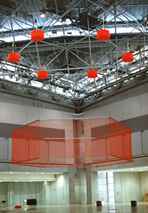
|
|
Sep. 3, 1996
|
Column Index - Aug. 20, 1996
|
|
![]()
|
<Atopic Site>is held from August 1 to 25 at the Tokyo Big Sight West 3 Hall. A related project based on the atopic theme, "On Camp/Off Base", is also held from August 10 to 19 at the West 4 Hall. The Internet project, "Tokyo Art Zone", is also being shown.
The project by Ocean Earth suggesting effective usage of ocean
resources and rivers.
The structure for the "Clean Air Rig" by Ocean Earth exhibited at the Tokyo Big Sight.
|
The possibility of the <Atopic>
The problems surrounding the city Currently I am working for an exhibition called the "Atopic Site". This is an exhibition in which projects by artists tackling various issues concerning the city around the world under the theme of <The crisis and the regeneration of the city>, are exhibited at the Tokyo Big Sight located in the new coastal city area, an area symbolizing the extreme of post-urbanism. The city, especially urban projects after the modern age, has been progressing with a goal (defined in capital letters) of "managing the ideal city". However, describing the society using such a "perspective system" was unreasonable in the first place. For example, at the end of the 16th century, it is said that in the big cities, there were already homeless people (the history of the homeless, the exiled, and the refugees must be taken up more frequently). Although this was probably considered as a problem, it was actually something more - something inseparable from the superficial splendor of the <body> called the "city", and the real problem lay in the project called the "modern" trying to totally exclude such issues as a pathology. In the contemporary world, where the city continues to expand electronically showing various aspects deviating from a consistent dimension, the problems surrounding the city should not be considered as diseases, but we must start to rediscover them as new potentials=resources for the future. Art having a mutually provocative relationship with society Although problems seen around the world (they are connected by the cities or through the cities) seem to derive from each cultural/social context, in the end they are shared and have the potential of happening anytime, anywhere in a different form. Imagination that reminds us of this fact is necessary today. Particular challenges and motifs of each place can be exchanged and shared among us. In other words, we must assume the "atopic" nature having the potential of transference in the topic or the topos, and they will occur in a hybrid and "shuffled" form. In the society, the artists function as sensitive reactors, and with their de-territorialism/de-centricism, they have the possibility of provoking society and even art itself. Art is created with society, and society could be developed by art. In other words, the society and art are in a mutually provocative relationship. In this exhibition, (the city) is shown as the <site> in which that relationship is developed. The atopic world view The artists involved in the projects tackle the specific issues of a cities, while sharing the problems of the <city>, understood today in a broader meaning. They also maintain a global viewpoint, at the same time developing activities based on a very micro-political level which is the standpoint of the people living in such places. Moreover, this is done not as a social movement, but as an activity done by an outsider. The artist I work with, OCEAN EARTH, is a group of artists, engineers, architects, etc. centering around Peter Fend. They advocate escape from the consumer society based on material things and "human-centricism" by promoting the distribution of information (in the broad sense) on a global scale (including natural environment). In other words they promote a world view based on "info-ecology/info-economy" as art. Naturally this has an atopic nature. Peter Fend himself, who travels around the world, developing ideas by globally relating issues he finds in various areas, is the embodiment of the "atopic" (and homeless) nature. [Yukiko SHIKATA/ Art Critic]
|
|
|
|
|
|
|
|
|
Sep. 3, 1996
|
[home]/[Art information]/[Art Watch]
Copyright (c) Dai Nippon Printing Co., Ltd. 1996
Network Museum & Magazine Project / nmp@nt.cio.dnp.co.jp


